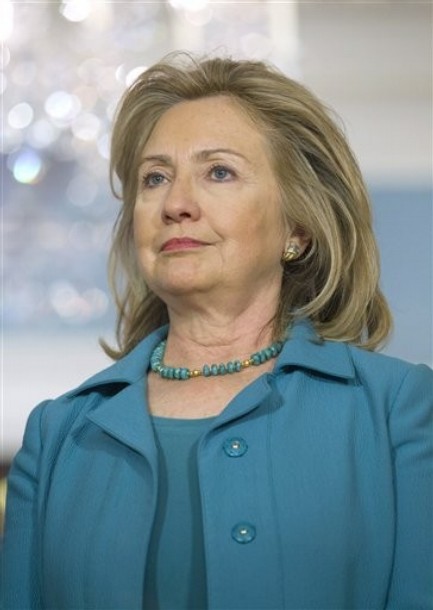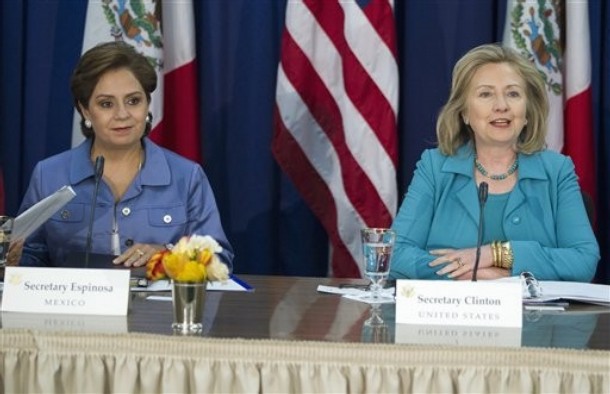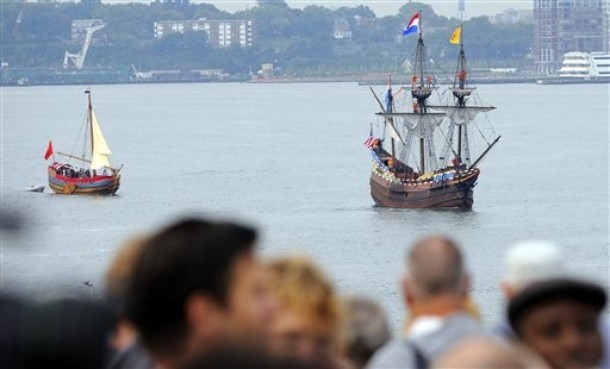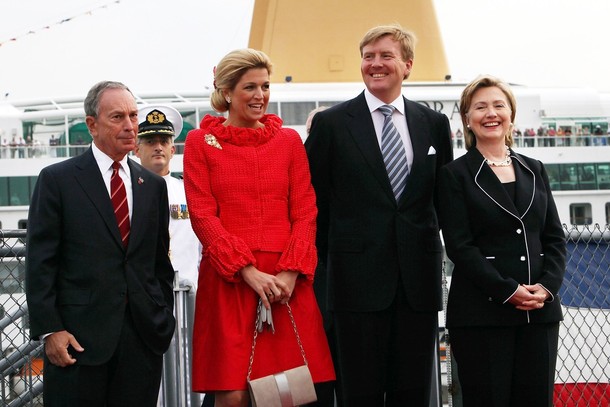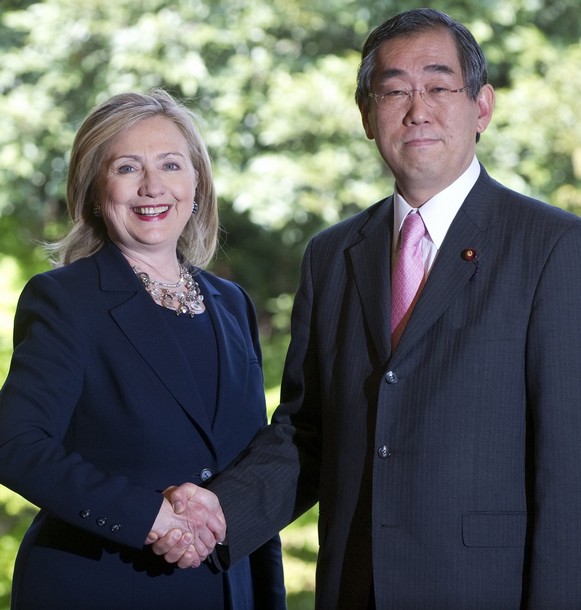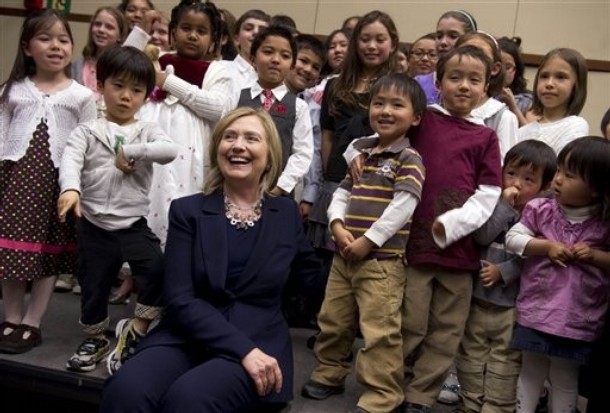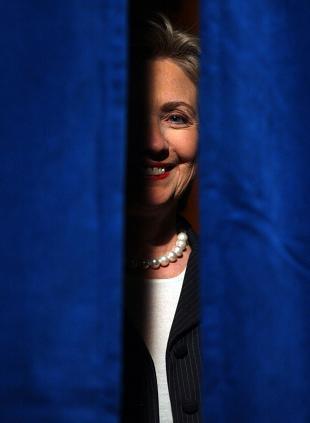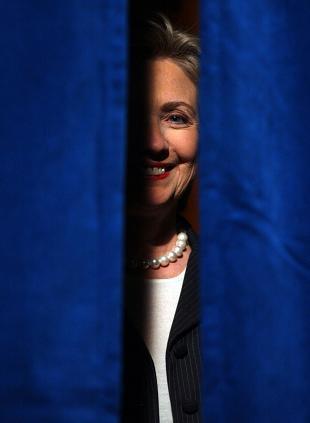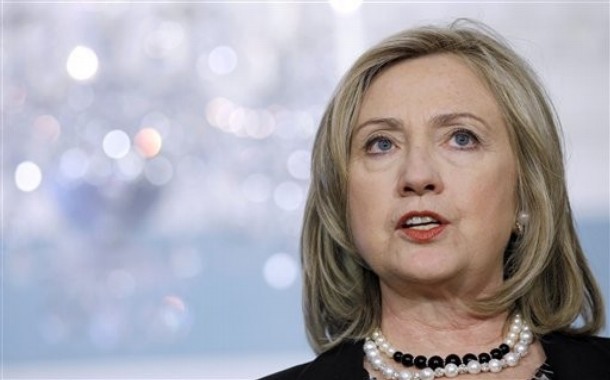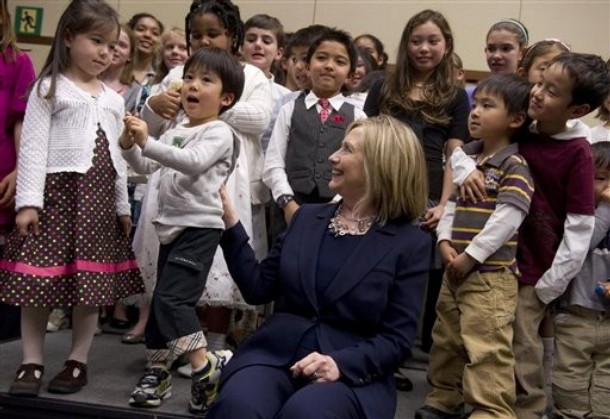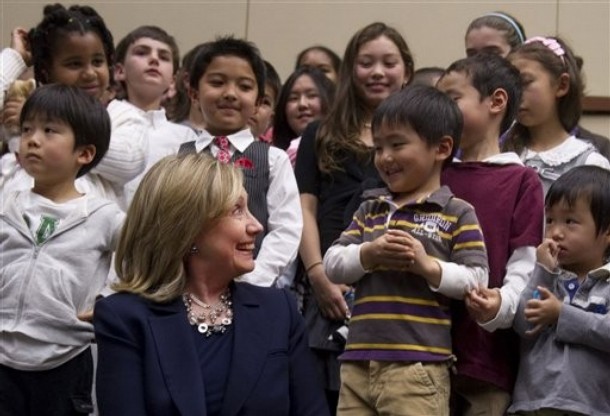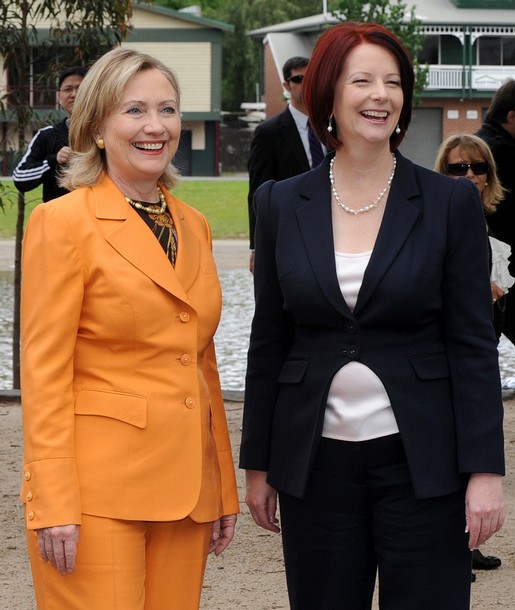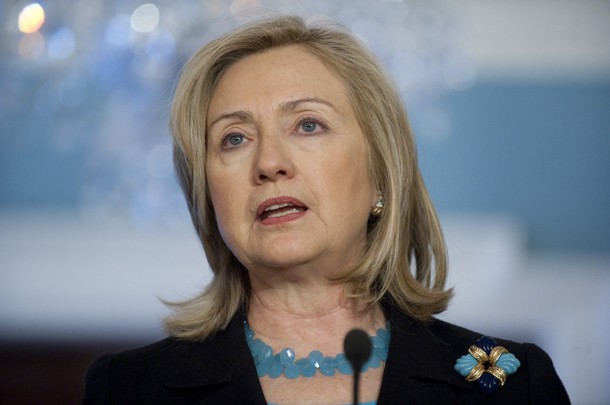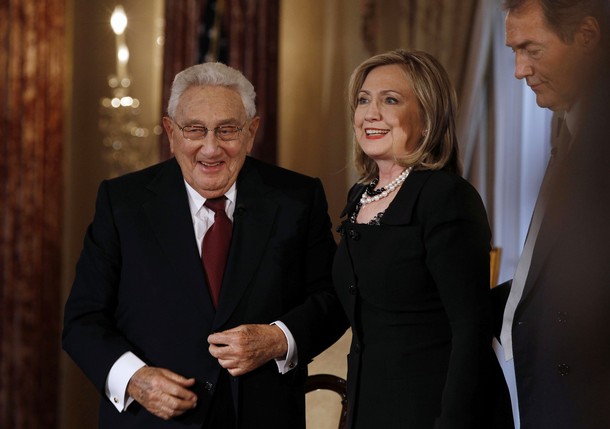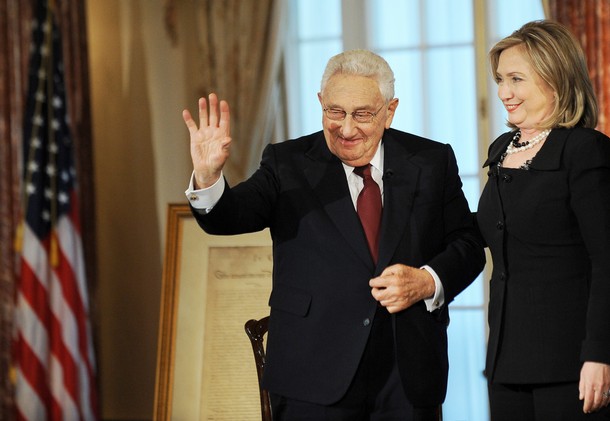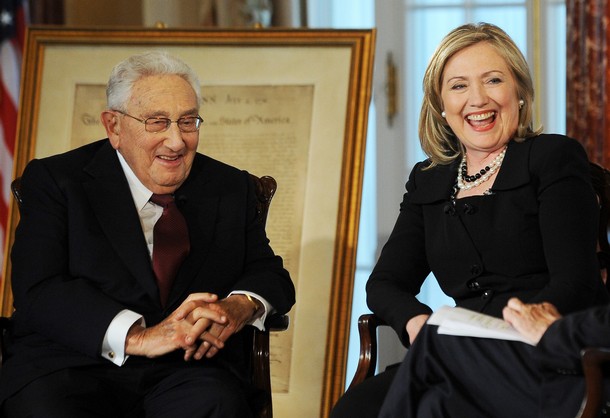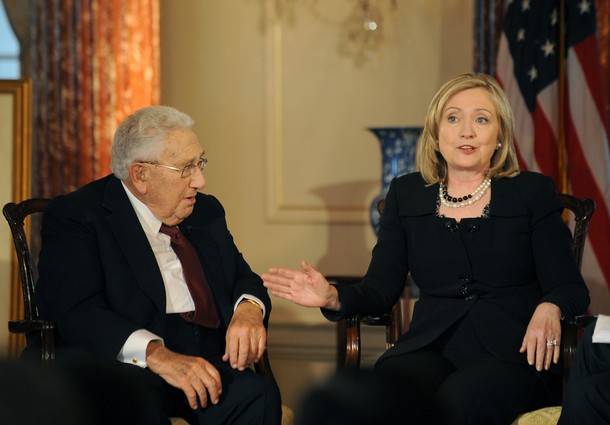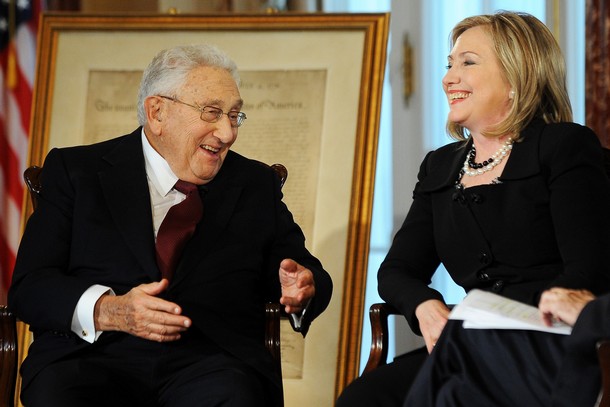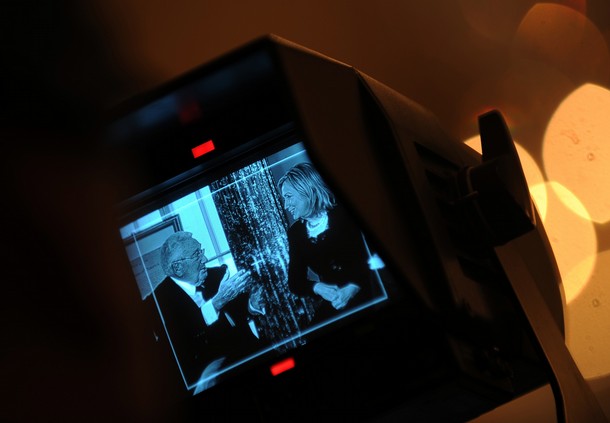The Human Rights Council's Special Session on Syria
Press Statement
Hillary Rodham Clinton
Secretary of StateWashington, DCApril 29, 2011Today the UN Human Rights Council took urgent action to shine a light on the deteriorating human rights situation in Syria and condemn the continued human rights abuses by the Syrian government. Today’s resolution - passed with an overwhelming majority by members from all regions of the globe - unequivocally indicates that the use of force by the Syrian government to quell peaceful political demonstrators is unacceptable. The international community has spoken and expressed its outrage at the violence used by the Syrian government to deny its population their universal human rights, including the freedoms of expression and assembly.
The Council’s forceful statement, coupled with its decision to establish an urgent investigation led by the Office of the High Commissioner for Human Rights, ensures that the international community will remain actively engaged in the human rights crisis in Syria.
The Council also called upon the Syrian government to immediately release all prisoners of conscience and arbitrarily detained persons, including those who were detained before the recent events, and to immediately cease any intimidation, persecution and arbitrary arrests of individuals, including lawyers, human rights defenders and journalists.
The findings of this Special Session further reinforce the crucial need for Council members to reject Syria’s hypocritical candidacy for membership on the Human Rights Council. No country engaged in such horrific and ongoing human rights abuses should be considered for membership on this important body.
Saturday, April 30, 2011
Hillary Clinton to Human Rights Council: Reject Syria's Candidacy
Upcoming: Rome on Hillary Clinton's Agenda

Secretary Clinton to Travel to Rome, Italy
Media NoteMark C. Toner
Acting Deputy SpokesmanOffice of the SpokesmanWashington, DC
April 29, 2011Secretary of State Clinton will travel to Rome, Italy May 4-6 to participate in a meeting of the Libya Contact Group. The Rome meeting will build on the last Contact Group meeting held in Doha and will allow the United States to discuss with its international partners the ongoing implementation of United Nations Security Council Resolutions 1970 and 1973.
Secretary Clinton will also conduct a series of bilateral meetings, including Italian Prime Minister Silvio Berlusconi, President Giorgio Napolitano, and Foreign Minister Franco Frattini. Assistant Secretary Philip H. Gordon and Assistant Secretary Jeffery Feltman will accompany the Secretary on this trip.
Friday, April 29, 2011
Video: Secretary Clinton and Japanese FM Matsumoto After Their Meeting Tonight
Remarks With Japanese Foreign Minister Takeaki Matsumoto After Their Meeting
RemarksHillary Rodham Clinton
Secretary of StateTreaty Room
Washington, DC
April 29, 2011SECRETARY CLINTON: Well, good evening, everyone, and thank you for your patience on a very busy day. But this is a particular privilege for me to welcome the minister to the State Department for his first visit as the foreign minister of Japan.
Just two weeks ago, we met in Tokyo to discuss Japan’s ongoing efforts to rebuild after the earthquake and tsunami. The people of Japan have faced these disasters and the subsequent nuclear emergency with courage and conviction, inspiring the world with their strength. Today, I conveyed again the commitment of the American people to support our friends in Japan however we can, and particularly to work through the public-private partnership for reconstruction, bringing together the Japanese and American business communities in support of the Japanese Government’s plan for recovery.
In addition to these very important issues, we discussed a number of other regional and global matters of great concern to both of us. We discussed North Korea and reconfirmed out shared goal of a complete and irreversible denuclearization of the Korean Peninsula. I shared with the minister the upcoming plans for the third U.S. Strategic and Economic Dialogue with China meeting here in Washington in just over a week.
We also discussed developments in the Middle East, and I am grateful to Japan for its support in dealing with the increasingly alarming situation in Syria, as well as its solidarity with us and the European Union with regard to Iran and the dangers of nuclear proliferation. Japan has also made critical contributions to reconstruction and reconciliation in Afghanistan, and the government just announced it will continue its financial assistance to Afghanistan at the same levels as before the earthquake. That is a remarkable example of both leadership and generosity that we appreciate.
There are so many important matters for us to discuss that the minister and I are committed to carrying on our close consultation. We are working very hard to set a new date for the Security Consultative Committee, known as the “2+2.”
So, Minister, please let me again express my appreciation to you and to your government for the work we are doing together and the very important work that lies ahead as well.
FOREIGN MINISTER MATSUMOTO: (Via interpreter) Thank you very much, Madam Secretary. I am Takeaki Matsumoto, Foreign Minister of Japan. Since taking office as foreign minister of Japan on the 9th of March, we have – Japan and the U.S. Government have maintained close coordination with each other.
I’ve had numerous opportunities of meeting as well as teleconferencing with Secretary Clinton. And it was my fervent hope to make the United States the first destination for my very first bilateral visit overseas, and I’m happy that it has become true.
We’ve been receiving very generous support and very generous and warm support from the United States following the earthquake. And one of the major objectives of my visit this time was to express directly to the U.S. Government and people that gratitude. But I regret to say that even before expressing gratitude, I may need to also express our sympathies to the United States for the very heavy damage and the very serious casualties, as well as heavy damage, caused by the most recent tornados in the United States. And as I watched the images on the television screen of the damage, it inevitably made me remember the earthquake damage of a month and a half ago. We, of course, are right in the middle of dealing with the aftermath of the earthquake, but I told Secretary Clinton, please tell us if there is anything we can do in also response to the tornadoes.
But again, let me say that we are truly grateful for the support that we received from the United States following the earthquake. And we’ll never forget the very strong support that we have received from the United States, from the – the very large number of service – U.S. service members who were engaged in Operation Tomodachi. The rescue teams who arrived on the ground very early on right after the earthquake and the many nuclear experts who are now on the ground helping us. And we’ve also – let me say that we’ve been touched by the expression of sympathy and support by a large number of people in the United States, notably small children who have also sent their messages to Japan.
I regret to say that two Americans who were engaged in what is called JET Program, a program for Americans and other English-speaking people to teach Japanese to small children, schoolchildren, and two of these Americans lost their lives because of the earthquake. They had been serving as a bridge between Japan and the United States. We’ll never forget the deep thoughts that they had for Japan and the fact that they were helping raise good children in Japan.
As Secretary Clinton mentioned just now, in our meeting today we did cover a broad range of issues. We were hit by the earthquake, but we wish to emerge stronger by overcoming the earthquake and continue to fulfill our responsibilities in the international community.
In connection with the evolution of the Japan-U.S. alliance, Madam Secretary Clinton already referred to the 2+2. Both of us see eye to eye on the importance of that 2+2 and will continue our coordination efforts to work out a schedule for that meeting.
With regard to, or in connection with the public-private partnership for reconstruction, we’ll bear in mind, of course, the blueprint for reconstruction that Japan is now drawing up, and we agreed that we’ll promote cooperation by focusing on building Japan-U.S. mutual trust between our two countries and striving to regain the trust of the international community in the Japanese economy by, in the first place, preventing or stopping damage caused by rumors, so-called reputation damage, and also gaining the trust of the international community with regard to Japan’s role as supply chain.
We also did discuss some regional issues. And in connection with the DPRK, we did agree that we’ll – or we reaffirmed the close coordination among Japan, U.S., and the Republic of Korea, and also agreed of the importance of constructively building relations with China. And also, the Secretary was kind of enough to show her understanding with regard to the abduction issue. Let me also report to you that we did discuss the situation in the Middle East, nuclear safety, as well as UN Security Council reform.
So once again, I would like to express our gratitude for the support given by the United States, and also would like to communicate to the people in the United States our determination to recover from the aftermath of the disaster, with the help of the United States as well, and would like to tell you that we will maintain closely coordinated with the United States.
SECRETARY CLINTON: Thank you, Minister. Thank you very much.
MS. FULTON: First question comes from Elise Labott with CNN.
QUESTION: Madam Secretary, Mr. Minister, I’d like to ask you on the Syria sanctions that President Obama issued today, although there were some members of President Asad’s family and the intelligence community that were named, President Asad himself wasn’t named. And if, in fact, as the United States attests, that he is a dictator and has absolute rule in the country, how can he not be personally held responsible for the human rights abuses in his country?
And on North Korea, there’s been a flurry of activity in the region lately, which suggests that there could be a thaw in the stalemate over Six-Party Talks. Do you envision Six-Party Talks restarting soon?
And Mr. Minister, respecting your comments about what the U.S. has already done, is there anything else that the United States and the American people can do to help Japan as they rebuild? Thank you.
SECRETARY CLINTON: Elise, the sanctions that were announced today are intended to show the Syrian Government that its behavior and actions are going to be held to account and they must begin taking steps to respond to the legitimate aspirations of their people and respect the rights of their people.
We continue to condemn in the strongest possible terms the absolutely deplorable actions that the Syrian Government is taking against its own people. The violence must end immediately, and we are conveying that both bilaterally and multilaterally to make it absolutely clear what is expected of the government.
I welcome today’s action in the Human Rights Council condemning the Government of Syria for its violent crackdown. With this action, the council has stood against attempts to silence dissent with the use of gratuitous violence. That is not the act of a responsible government. And the Human Rights Council has set a precedent which has advanced the importance of this organization, mandating an urgent mission by the Office of the High Commissioner for Human Rights to investigate all alleged violations of international law, with the goal of bringing perpetrators to justice. We were strongly behind this action and we will strongly support its implementation.
And with respect to North Korea, we have made consistently clear what we expect from North Korea in its actions in the future. We would like to see them engaging in meaningful dialogue with the South in the first instance, prior to any other steps that might be taken.
FOREIGN MINISTER MATSUMOTO: (Via interpreter) I understand the question for me was about support for Japan. What Japan in general, as well as the people in the afflicted areas in particular, are seeking now is opportunity for economic activity. So please do come to Japan for tourism and for business. And please do buy Japanese products as you were before, or perhaps more than before. (Laughter.) And please do invest in Japan and contribute to an even greater level of economic activity. In fact, the U.S. Government as well the leaders of the U.S. private sector are already working in that direction. And I’m sure that should this sort of movement spread in the United States, that will inevitably spread around the world as well. So we do count on continued warm and strong support from the United States.
MS. FULTON: Next question goes to (inaudible) from (inaudible).
QUESTION: (Via interpreter) (Inaudible), reporter with the Shimbun. And I’d like to ask this question of both of you. You mentioned that you did discuss 2+2, but I wonder if any reference was made to the upcoming visit by the prime minister to the United States. If not, what is your sense of the timing of that visit, when would that be desirable? And also you mentioned that you did discuss that you will continue to coordinate on the dates of the next 2+2. You agree on the importance of the 2+2. But I wonder if you can tell us what specifically you’re going to confirm or discuss in the upcoming 2+2 meeting.
FOREIGN MINISTER MATSUMOTO: (Via interpreter) Well, first of all, 2+2 meeting will have to take place ahead of the prime minister’s visit to the United States, so it is from that vantage point that we are discussing the date of the next 2+2 meeting. And also it is our common understanding that we’ll continue to discuss the specific dates for the prime minister’s visit to the United States. But I trust that the two countries do share very deeply common awareness, common understanding regarding the significance that the prime minister’s visit to the United States will have on Japan-U.S. relations.
And with regard to specific discussions at 2+2, I think it is also our common understanding that deepening of Japan-U.S. alliance and Japan-U.S. cooperation and building on the Japan-U.S. cooperation that we saw following the earthquake would be one of the objectives of that meeting as well. And both of us understand that we’ll be covering a lot of items, including common strategic objectives, as well as the military bases issues.
SECRETARY CLINTON: I’m very grateful for the minister’s visit and, as he said, we look forward to continuing our consultations between us in the 2+2 format and in many other settings going forward.
Thank you all very much.
Secretary Clinton's Remarks With Mexican Foreign Minister Patricia Espinosa
Remarks With Mexican Foreign Minister Patricia Espinosa Before Their Meeting
RemarksHillary Rodham Clinton
Secretary of StateTreaty RoomWashington, DCApril 29, 2011
SECRETARY CLINTON: Well, this is a particular delight for me to welcome back a friend and a colleague of great distinction. The minister and I have closely collaborated together for the entire time that I have been Secretary of State. And I want to thank her and thank the Government of Mexico for the very important work we are doing together between our two countries and also for Mexico’s leadership on so many regional and global issues. So welcome again.
FOREIGN MINISTER ESPINOSA: Thank you. Thank you, Secretary. I want to say I’m delighted to be back here. Today, we’re having a very important meeting. I have come with a big group of the members of the cabinet in Mexico. We will review our cooperation in many areas, and particularly the areas of security. And this is an area where we have been given clear instructions by the presidents to work together. This is the only way that we will be able to face the challenges in this area. So thank you very much, my friend, and I want to say also I appreciate enormously Mrs. Clinton’s friendship and the way she has supported our work together, not only bilaterally, but also in regional and global matters. Thank you.
Secretary Clinton's Remarks with Swedish FM Bildt
Remarks with Swedish Foreign Minister Carl Bildt Before Their Meeting
RemarksHillary Rodham Clinton
Secretary of StateTreaty Room
Washington, DC
April 29, 2011SECRETARY CLINTON: Well, I am delighted to see the Foreign Minister of Sweden Carl Bildt, a long-time friend and colleague to many of us with whom I have the pleasure now of working and consulting on a broad range of issues. Obviously, the relationship between our two countries is strong and enduring, and we work closely together on many other matters, particularly now in Libya, but also in the Balkans and Afghanistan and all through the litany of challenges and opportunities that we face. So it’s great to have you here, Carl.
FOREIGN MINISTER BILDT: Great to be here. We have, as the Secretary said, a stellar relationship – (laughter) – between the two countries. We meet fairly regularly at different international meetings, but it’s nice to be able to come here for, sort of, (inaudible) or whatever it is.
There are lots of issues that are on the agenda. Perhaps primarily what we can do together to support the demands for dignity and democracy that we see all over the Arab world where we, Europeans and Americans, are doing whatever we can to support the aspirations of the Arab people. That is most demanding, but also historically a duty that we have.
SECRETARY CLINTON: Thank you.
FOREIGN MINISTER BILDT: Thank you.
SECRETARY CLINTON: Very happy to have you here.
Secretary Clinton's Message on Queen's Day in the Netherlands
We do not have royals here which many Americans might have been reflecting upon while all of Westminster sang to the Queen who was the only one without her voice raised this morning. We sing to each other about our flag, and we like it that way. But some of our good friends and oldest allies are monarchies. The Netherlands is one of these. The pictures are from September 2009 when a replica of Henry Hudson's Half Moon entered New York Harbor to celebrate the 400th anniversary of that event. We also see Secretary Clinton and Mayor Mike Bloomberg with Dutch Royals at this celebration.
Here is Mme. Secretary's message on Queen's Day in the Netherlands. We also extend congrats to the UK for a fabulous wedding this morning. The throngs in the streets so disciplined moving toward the palace were truly impressive. Spectacular! Best of luck to the royal couple!
Queen's Day in the Netherlands
Press Statement
Hillary Rodham Clinton
Secretary of StateWashington, DCApril 29, 2011On behalf of President Obama and the American people, I congratulate the people of the Netherlands as you commemorate Queen’s Day this April 30.
The Netherlands was one of the first European powers to recognize the United States, cementing our close relationship early in our histories. We celebrate more than 200 years of close diplomatic relations between the Netherlands and the United States, but the ties between our countries and our people go back more than 400 years. Since Henry Hudson landed on Manhattan in 1609, the Netherlands and North America have been inextricably linked.
Today, our partnership is as strong as ever as we work together on a range of global issues. The Netherlands and the United States share a special economic, cultural and military alliance that is building a safer, more peaceful world. This is a partnership based on mutual respect and shared values, including an unwavering commitment to tolerance, freedom, democracy, and justice.
I wish Queen Beatrix and all the people of the Netherlands, Aruba, and the Dutch Antilles a happy celebration, and look forward to deepening this partnership even more as we work for a brighter future for all our people.
SECRETARY HILLARY RODHAM CLINTON: Public Schedule for April 29, 2011
Public Schedule for April 29, 2011
Public ScheduleWashington, DCApril 29, 2011SECRETARY HILLARY RODHAM CLINTON
9:30 a.m. Secretary Clinton holds a bilateral meeting with Swedish Foreign Minister Carl Bildt, at the Department of State.
(CAMERA SPRAY PRECEDING BILATERAL MEETING)
10:40 a.m. Secretary Clinton holds a bilateral meeting with Mexican Foreign Minister Patricia Espinosa, at the Department of State.
(CAMERA SPRAY PRECEDING BILATERAL MEETING)
11:00 a.m. Secretary Clinton participates in the U.S.-Mexico Merida High Level Consultative Group meeting with Mexican Foreign Minister Espinosa, at the Department of State.
(CAMERA SPRAY)
12:50 p.m. Secretary Clinton hosts a working lunch for the U.S.-Mexico Merida High Level Consultative Group with Mexican Foreign Minister Espinosa, at the Department of State.
(CLOSED PRESS COVERAGE)
3:00 p.m. Secretary Clinton attends a meeting at the White House.
(MEDIA DETERMINED BY WHITE HOUSE)
5:30 p.m. Secretary Clinton holds a bilateral meeting with Japanese Foreign Minister Takeaki Matsumoto, at the Department of State.
(JOINT PRESS AVAILABILITY FOLLOWING BILATERAL MEETING AT APPROXIMATELY 6:05 P.M.)
Thursday, April 28, 2011
Secretary Clinton Meets with Students and Teachers from Bosnia and Herzegovina

Secretary Clinton Meets with Students and Teachers from Bosnia and Herzegovina Participating in State's Youth Leadership Program
Media NoteOffice of the SpokesmanWashington, DCApril 28, 2011On April 28, 2011, Secretary of State Hillary Rodham Clinton met with more than 20 secondary school students and teachers from Bosnia and Herzegovina who are participating in the Youth Leadership Program, an exchange organized by the Department of State’s Bureau of Educational and Cultural Affairs. During the meeting, Secretary Clinton highlighted the United States’ commitment to the people of Bosnia and Herzegovina and talked about the important role young people play in shaping the future of their country.
The participants represent the 12th annual delegation of this exchange, which brings Bosnians of different ethnic backgrounds together in the United States for four weeks of leadership training, community service, home stays, and study of civics, debate, and conflict resolution.
During a three-week stay in Salem, Oregon, the students visited Oregon’s courts, joined a local non-governmental organization for a community service project, learned about civic leadership, and lived with American families. The participants, who come from Bijeljina, Orasje, and Bihac, arrived in the United States on April 1, 2011.
In addition to the meeting with Secretary Clinton, the one-week Washington, DC portion of their trip included programs with local American high school students and visits to the U.S. Capitol building and U.S. national landmarks. When the students return to Bosnia and Herzegovina, they will design and implement volunteer projects in their schools. The teachers, who accompanied the students, took part in professional development and mentoring programs.
The Youth Leadership and Program began in Bosnia and Herzegovina twelve years ago and today serves as a model for similar U.S. Department of State-sponsored programs around the world. The program brings together socially committed student leaders from different parts of the country to visit the United States for four weeks of leadership training, community service, home stays, and study on civics, debate and conflict resolution. Since its launch, 240 students and teachers from around Bosnia and Herzegovina have participated in the program.
Secretary Clinton Swears-in Adorable Temporary Staff
Swearing-in Ceremony of "Take Your Child to Work" Day
RemarksHillary Rodham Clinton
Secretary of StateDean Acheson Auditorium
Washington, DC
April 28, 2011SECRETARY CLINTON: Thank you so much. (Applause.) Well, I am so excited to see so many of you here today and to welcome you to the State Department. I know that some of you have been here before, but how many of you have never been to the State Department before? Raise your hand. Oh, that’s good. So we’ve got a good number that are here for the first time. So as you go through your day, ask whatever questions you want of the people that are around you, because I want you to learn a lot about what we do here at the State Department. Because we really couldn’t do our jobs without the support of our families, and in a very real way, each and every one of you whose mom or dad or aunt or uncle or grandmother or grandfather or somebody else who brought you today, we really couldn’t do it without you understanding and supporting how important this work is.
I also want to single out two groups. First, the students who are guests from Miner Elementary. Who’s here from Miner Elementary?
AUDIENCE: (Cheering.)
SECRETARY CLINTON: Yay! (Applause.) Well, I know that there are a lot of State Department employees who give their free time to Miner Elementary and the students there and the teachers, and we’re delighted you could join us.
And then I particularly want to welcome any of you whose mom or dad aren’t home because they’re serving our country somewhere else. Maybe they’re in Iraq or Afghanistan or Pakistan or Yemen or Syria or lots of other places that are very challenging right now. And then there are some of you who had to be evacuated, who left a lot of friends and maybe your schools in the Ivory Coast or in Egypt or in Libya or some other place that – because you couldn’t stay because of what was going on. So I especially want to welcome each and every one of you here and thank you for your understanding and support of somebody in your family, a mom or dad or someone else, who is far away and maybe misses a birthday party or a ballgame or a recital or a school event. They think about you all the time. And thankfully with technology now, they can actually communicate with you. So I am very grateful for your understanding and your support.
At the State Department we do a lot of work everywhere in the world, trying to help our country with the important issues that we face. I’m very proud of all the people who work here. Some are helping to protect our environment, our oceans or our air or our land. Some are helping to end wars and conflicts, try to bring warring people together so that maybe they can figure out a way to get along. Sometimes we’re opening up business opportunities so that more people back here in the United States can have jobs. And sometimes we are talking about what America stands for, who we are as a people, what our history is, what our values are, by reaching out into the community and trying to be involved with what goes on in another country. Every single day that’s what people here do, whether they’re posted in Washington or they’re posted at a mission overseas.
And I really want you to know that we want to help people. We want to keep our nation strong and safe. But mostly we do the work we do because we want you to have a better future. We really want you to be in a world that is more peaceful, more prosperous, more positive about what will happen not just in our country, but in all the countries that you may travel to as you get older.
And because we are engaged around the world, it’s a 24/7 job, because when we’re asleep, somebody else halfway around the world is awake. And that means that a lot of our people working here and working elsewhere in the world are on call all the time, because you never know what’s going to happen and what it’s going to take for us to be involved and helpful.
I think that it is one of the most rewarding jobs that anyone could have. And as you go up through the years of your schooling, I hope you’ll think about maybe a career here at the State Department, study languages, learn about science and technology, particularly new communication. Because now, since I’ve been Secretary of State, we are on Twitter and Facebook, we’re communicating in many different languages because we want to reach people where people are actually involved online. Read everything you can about history, particularly world history, and keep up with the news every day, because even if you decide you’re not going to go into the Foreign Service or the Civil Service or some other role in helping our country work around the world, you’ll be an informed citizen, and we and our democracy really need as many informed citizens as possible.
Now, we have a tradition here at the State Department on this "Take Your Child to Work" Day that all of you become honorary employees for the day. So this is kind of a big deal, because it’s not just that we want you to come and hang around, we want you to participate. But in order to do that, you have to take an oath, which is what we do when we swear people in – that’s the description – when we have somebody raise their hand and take an oath, then they come to work and work on behalf of our country.
So I want you please to stand up. Inside your folders, there’s a copy of the oath. Just the people being sworn in – the adults can stay seated, but just our honorary employees for a day. And the oath is inside, so you can follow along. Raise your right hand and repeat after me.
Secretary Clinton administers oath.
SECRETARY CLINTON: Well, congratulations! You are now honorary employees. (Applause.)
I hope you have a wonderful day here. I hope you get lots of work done for America. I hope you will ask every question you can imagine that you’re interested in, because that’s what we’re here for today, is to answer those questions, and that I hope you will seriously think about coming back and working with us full-time, sometime in the future, after you finish all of your education. I am so proud of you, and I am so pleased that you could be here.
Thank you all, honorary employees for the day. (Applause.)
SECRETARY HILLARY RODHAM CLINTON: Public Schedule for April 28, 2011
Public Schedule for April 28, 2011
Public ScheduleWashington, DCApril 28, 2011
SECRETARY HILLARY RODHAM CLINTON
9:15 a.m. Secretary Clinton meets with the Assistant Secretaries of the regional bureaus, at the Department of State.
(CLOSED PRESS COVERAGE)
10:00 a.m. Secretary Clinton holds a swearing in ceremony for children of Department of State employees participating in Take Your Child to Work Day, at the Department of State.
(OPEN PRESS COVERAGE)
10:50 a.m. Secretary Clinton attends a meeting with President Obama at the White House.
(MEDIA DETERMINED BY WHITE HOUSE)
11:30 a.m. Secretary Clinton meets with President Obama at the White House.
(MEDIA DETERMINED BY WHITE HOUSE)
12:15 p.m. Secretary Clinton holds a bilateral meeting with Omani Foreign Minister Yusuf bin Alawi bin Abdullah, at the Department of State.
(CAMERA SPRAY PRECEDING BILATERAL MEETING IN THE MADISON ROOM)
2:45 p.m. Secretary Clinton meets with youth and teachers from Bosnia and Herzegovina participating in a Bureau of Educational Affairs program on youth leadership, at the Department of State.
(CLOSED PRESS COVERAGE)
3:10 p.m. Secretary Clinton attends President Obama’s personnel announcement at the White House.
(MEDIA DETERMINED BY WHITE HOUSE)
3:45 p.m. Secretary Clinton joins President Obama’s bilateral meeting with Panamanian President Ricardo Martinelli, at the White House.
(MEDIA DETERMINED BY WHITE HOUSE)
What goes around comes around. Father Pfleger gets his!
I could not be more validated, as a Catholic, a Hillary supporter, and as a woman! His portrayal of a sincere, dedicated, striving presidential candidate who happened to be a woman was offensive, sexist, and unbecoming a Catholic priest. The archbishop let him have it. I could not be happier. Well, if only they would beatify my Evita, I would be. And if HRC runs for 2012, you will find me over the moon, but I will have filed my absentee ballot!
Archdiocese of Chicago suspends activist South Side priest Pfleger over transfer disagreement
By Associated Press, Wednesday, April 27, 11:46 PM
CHICAGO — An activist Catholic priest in Chicago who made headlines when he mocked Hillary Clinton during her presidential campaign has been suspended by the archdiocese in a disagreement over a proposed transfer.
Cardinal Francis George earlier this year offered the Rev. Michael Pfleger the presidency of a Catholic high school near the church.
Pfleger has said recently he would leave the Roman Catholic Church rather than be removed from his South Side parish. Pfleger has been pastor at St. Sabina Church for more than 30 years.
George wrote to Pfelger, “If that is truly your attitude, you have already left the Catholic Church and are therefore not able to pastor a Catholic parish.”
Wednesday, April 27, 2011
Rise, P.J., Rise!
Well, our Mme. Secretary is on a break that I would NOT call a vacation. But good news came in about our friend and former chief spokesperson, P.J. Crowley! Go P.J.!

Former State Department Spokesman Crowley to Join Penn State Law School
April 26, 2011 6:20 PMby StateCollege.com StaffPhilip J. "P.J." Crowley, a former U.S. State Department spokesman under Secretary of State Hillary Clinton, will hold a key chair at the Penn State Dickinson School of Law.
Tuesday, April 26, 2011
SECRETARY OF STATE HILLARY RODHAM CLINTON:Public Schedule for April 26, 2011
OK! This is more like it! At least this is on time, even if she is still hiding!
Public Schedule for April 26, 2011
Public ScheduleWashington, DCApril 26, 2011
SECRETARY OF STATE HILLARY RODHAM CLINTON
Secretary Clinton has no public appointments.
YESTERDAY'S Public Schedule: Secretary of State Hillary Rodham Clinton
They say better late than never, but this is ridiculous! This was just posted: 9:56 EDT April 26, 2011.
Public Schedule for April 25, 2011
Public ScheduleWashington, DCApril 25, 2011SECRETARY OF STATE HILLARY RODHAM CLINTON
Secretary Clinton has no public appointments.
Monday, April 25, 2011
Secretary Clinton's Statement on the Situation on Thailand-Cambodia Border
Well even on her Easter Week R & R, the Secretary of State took the time to release this statement.
Situation on Thailand-Cambodia Border
Press StatementHillary Rodham Clinton
Secretary of StateWashington, DCApril 25, 2011The United States remains deeply concerned about clashes between security forces along the Thailand-Cambodia border. We strongly urge both sides to exercise restraint, refrain from provocative acts, and immediately take all necessary steps to reduce tensions and avoid further conflict. The loss of life, displacement of civilians, and damage to property is regrettable.
We support the efforts of Indonesia in their role as chair of the Association of South East Asian Nations (ASEAN) to work with both countries to reach a resolution. The United States is also engaging with Thai and Cambodian officials directly on this matter. We continue to urge the Royal Thai Government and Royal Government of Cambodia to resolve their disputes peacefully to help strengthen regional stability.
HIllary Rodham Clinton: International Woman of Mystery
Well, Laura Rozen, posting on The Envoy today, offers some insights after some well-directed snooping.
Mon Apr 25, 10:48 am ETMini mystery: Where’s Hillary Clinton?
By Laura Rozen
"... it was very unusual when this week's State Department public "week ahead" itinerary described Clinton as having no public appointments at all on Monday, Tuesday, and Wednesday. Indeed, her first public appointment is not scheduled until Thursday morning—and that is a highly ceremonial appearance: officiating at a symbolic swearing-in of children of State Department employees participating in take your child to work today."
SNIP
"The Envoy has duly launched queries to the State Department. Readers are not advised to hold their breaths in anticipation of official replies, however: Both chief spokespeople at the State Department also appear to be out of the office this week, and the State Department notified the press that it is not holding its usual daily press conference today."
SNIP
"A State Department source says Clinton's taking a little Easter break R&R, although he did not reveal her location."
Read More>>>>
To which most regulars here will give a loud "Brava!" This, however is not the only Hillary-related mystery to pop up in today's news feeds. Tom Scocca at Slate, offers this savory little morsel. (I know. I usually eschew news sources, but if the State Department gives me nothing, I have to turn somewhere!)
Who's Smiling Now? Newsweek Gives Hillary Clinton a Snowclone
Posted Monday, April 25, 2011 2:55 PM | By Tom Scocca
Secretary of State Hillary Clinton joins actress Cate Blanchett and Zappos CEO Tony Hsieh on the ever-growing list of people who smile enigmatically. This time, it's Newsweek, the May 2 issue, page 17: "Why Is This Woman Smiling?", on an extended caption in its News Gallery section.
Read more>>>>
It is an interesting tidbit on two fronts. First because it is the second time, in short order, that Newsweek, under Tina Brown's management, features something of interest about HRC. It is not a cover story, but it tantalizes, which is the second reason it captures us. It has implications attached. Yes, we all want to know! Why is Hillary Clinton smiling? I am sure readers will provide plenty of speculation, but before it begins, let me assure you, I do not think the name David Miliband figures in. She never said she had a crush on him. Jonathan Van Meter, author of the Vogue article that will not go away, said he had the crush.
One last note, that swearing-in of the State Department kids is going to be very cute. After the long drought of HRC pictures and news, by Thursday, we will all be ready for some really cute pictures like these! (So there had better be a camera spray involved!)
Sunday, April 24, 2011
Saturday, April 23, 2011
Secretary Clinton's Statement on ANZAC Day
ANZAC Day
Press StatementHillary Rodham Clinton
Secretary of StateWashington, DCApril 22, 2011On behalf of President Obama and the people of the United States, I am pleased to send best wishes to the people of Australia and New Zealand on ANZAC day this April 25.
During my trip last year to Australia and New Zealand I saw firsthand the courage of your two nations as you continue to meet adversity with determination and resilience. As we salute the ANZAC spirit and celebrate its foundation, we are reminded of the strength of your countries and we honor those who fight for peace, progress and prosperity around the world. This day of remembrance is a tribute to your character and the depth of your partnership. Our thoughts are with all Anzacs who are serving, those who have served, those who have given their lives and their families.
The United States is your partner and we will continue to stand with you in support of freedom and democracy around the world. As the Ode of Remembrance says, “At the going down of the sun, and in the morning, we will remember them.”

Asseyez-vous, Madame La Secretaire!
It is a chilly, dreary Holy Saturday here in the northeast, and certainly we all hope Mme. Secretary is enjoying family time this holiday weekend. I thought I would insert a bright little spot into the gloomy day with this slideshow. HRC does something so cute upon taking her seat at conferences. I am pretty sure she is adjusting the height of the chair since I also do this in conference rooms. The SOS looks particularly fetching doing this. Short on pictures/long on cute!
Friday, April 22, 2011
SECRETARY HILLARY RODHAM CLINTON:: Public Schedule for April 22, 2011
Public Schedule for April 22, 2011
Public ScheduleWashington, DCApril 22, 2011
SECRETARY HILLARY RODHAM CLINTON:
9:00 a.m. Secretary Clinton attends a meeting at the White House.
(MEDIA DETERMINED BY WHITE HOUSE)
Thursday, April 21, 2011
Video: Secretary Clinton's Remarks With African Union Commission Chairperson Jean Ping
Remarks With African Union Commission Chairperson Jean Ping Before Their Meeting
RemarksHillary Rodham Clinton
Secretary of StateTreaty Room
Washington, DC
April 21, 2011SECRETARY CLINTON: Well, good afternoon. It’s a real pleasure for me to welcome Chairperson Ping of the African Union here to the State Department. Chairperson Ping and his delegation have been engaged in a consultation with members of our team here in Washington across our government. And we’re especially pleased about that because Africa is a matter of great significance to the Obama Administration, and we have every intention to broaden and deepen our relationship not only bilaterally with countries but also with the African Union.
I want to thank the chairperson for his personal commitment and leadership on behalf of the imperative of democratic transformation and establishment within the countries of Africa, his commitment to accountability and transparency and good governance. We wish to work with the AU in order to provide support for the programs that he has championed.
In addition, we seek the African Union’s assistance in arriving at a political solution in Libya. UN Security Council Resolution 1973 expressed the international community’s concerns about the actions of the Libyan Government under Colonel Qadhafi. Three African nations that are members of the Security Council voted for the resolution. And I appreciate what the African Union has said, urging that there be a democratic process that can be inclusive and supportive of the needs of the Libyan people, and I look forward to meeting with you now and discussing steps that we can take together.
So again, we welcome you to Washington and the State Department.
MR. PING: Thank you, Madam Secretary of State. I would like just to say that I am delighted to be here today. I’ve been received by you. It’s a pleasure for me – an honor not only on my own own capacity, but on the capacity of the African Union Commission and the whole continent.
As you have said, we are now confronted with so many problems in the continent and we need to exchange views with the rest of our partners. And in this specific context, it is good to be here today with you and to exchange views on the situation in Libya as well.
In the same time, as you know, we have started to strengthen our cooperation, multilateral cooperation with U.S.A. And this is our second meeting of that type, and we can see the difference. We started last year, the difference there in term of quality of our exchange, also the quantity of the partners with whom we have interacted.
Thank you very much for your kind invitation, and thank you for receiving us.
SECRETARY CLINTON: Thank you, sir. Again, welcome. Thank you all very much.
Secretaries Clinton and Kissinger: "Conversations on Diplomacy" Moderated by Charlie Rose
"Conversations on Diplomacy" Moderated by Charlie Rose
Remarks
Hillary Rodham Clinton
Secretary of StateFormer Secretary of State Dr. Henry KissingerWashington, DCApril 20, 2011Video from the “Conversations on Diplomacy” is available on the Charlie Rose Show homepage at http://www.charlierose.com/.
MR. ROSE: We’re at the State Department in Washington, D.C. for a special edition of Charlie Rose. It is called "Conversations on Diplomacy." We inaugurate the series with Secretary of State Hillary Clinton, and former Secretary of State Henry Kissinger. Other former Secretaries of State will follow. It is an opportunity to hear these men and women who have served as Secretary of State talk with Secretary Clinton about today’s issues, the philosophical framework for decision-making, our changing world and new realities. Also, to look back at the history of each. What can we learn from their experience? How do they view with 20/20 hindsight their action and their failure to act?
Secretary of State is a remarkable position held by a stunning group of Americans from Thomas Jefferson to George Marshall to Hillary Clinton, also other familiar names in American history like John Quincy Adams, Henry Clay, Daniel Webster, William Jennings Bryan, Charles Evans Hughes, Dean Acheson, Ed Muskie, and many more. They have come from an extraordinary diversity of experience, from university professor to Chairman of the Joint Chiefs, from politics to law. After the recent death of Warren Christopher, there are eight living Secretaries of State. There are, of course, Hillary Clinton, Condoleezza Rice, Colin Powell, Madeleine Albright, Lawrence Eagleburger, James Baker, George Shultz, and Henry Kissinger.
These conversations are being recorded at the State Department where room by room you can see America’s history and the object of history, and also a wonderful collection of American paintings and decorative art. The rooms are named for former Secretaries of State. The John Quincy Adams room is home to the desk at which the Treaty of Paris was signed ending the American Revolutionary War. The treaty was signed by John Jay, John Adams, and Ben Franklin. These rooms have witnessed historic meetings between American officials and foreign ministers and heads of state. We take note of the 50th anniversary of these rooms and the Patrons of Diplomacy Initiative.
We begin our conversations on diplomacy with Secretary of State Clinton and former Secretary of State Kissinger. Secretary Clinton came to this office after serving as first lady of Arkansas and the United States, and the United States senator from New York. She was appointed by President Obama after a spirited contest for the Democratic nomination for president.
Secretary Kissinger was a Harvard professor, National Security Advisor for President Nixon, and Secretary of State in the administrations of Richard Nixon and Gerald Ford.
I first want to thank Secretary Clinton for allowing us to come here at the State Department in these historic rooms.
SECRETARY CLINTON: Well, Charlie, we delighted to have you here for these conversations, and especially in these rooms which have seen a lot of history and which continue to help us chart our way forward. And I’m especially pleased to welcome back Dr. Kissinger for today’s discussion.
MR. ROSE: How do you see this world that has emerged? What are the factors, what’s the opportunity for the United States? Where do we want to go and how do we want to use our resources?
SECRETARY CLINTON: Well, I think about that question every day because, although there is a very clear continuity in American foreign policy that I would argue goes back to the very beginning of our country, every era presents its own challenges and opportunities. And today in this first part of the 21st century we clearly continue to spend an extraordinary amount of our time on state-to-state relationships. But we increasingly are focused on networks, on multilateral relationships and organizations, on charting the changes that are sweeping the world, many of them driven by technology and trying to understand the implications of those changes for the decisions that we make here.
There are many more actors who have a role to play and who are demanding that that role be recognized today. And we have to keep up with it. The flood of information that now comes to us, not just from traditional media but from all of the new forms of media, we’re just as likely to see events starting from Twitter feeds as from the statements of heads of state. And, therefore, we’ve had to adjust, and it has been one of my goals as Secretary of State to really look at 21st century statecraft and to recognize the increasing role that people-to-people diplomacy plays in assisting the United States in understanding trends, and in influencing decisions.
So it’s been -- I would hesitate to characterize completely, but it’s been a very active and challenging period for the last two-plus years.
MR. ROSE: I somewhere read that you’ve gone over the 512,000 miles.
SECRETARY CLINTON: Oh, but who’s counting?
(LAUGHTER)
MR. ROSE: And 83 countries.
SECRETARY CLINTON: Yes, yes.
MR. ROSE: Secretary Kissinger, when you were Secretary of State and National Security Advisor, there were two great superpowers Russia and the United States. Today, people say that there are limits on our power and that the United States has to live in a different world.
SECRETARY KISSINGER: Well, first of all, let me say what a pleasure it is to be back here. And as part of the community of former Secretaries of State who have a nonaggression treaty with each other --
(LAUGHTER)
MR. ROSE: A nonaggression treaty?
SECRETARY KISSINGER: They know what this job is like, and they know how close the decisions are that need to be made. So in all cases they would have great sympathy for their successors, and in this case it goes back a long time.
Now, when I served, we had two great superpowers, and we lived with the possibility of a nuclear catastrophe, which is, from that point of view, less likely today. But even then there were limits to American power, and the art of foreign policy is to operate at the limit of your power but not to go beyond it, and to recognize that other countries must feel they’re part of the international system or the tensions become unmanageable.
What is unique about this period, I think, is that for the first time in history, there are huge changes going on simultaneously in every part of the world, and that these changes are not of the same nature. In Europe, where the state system originated, the state is losing its significance, and they’re trying to form a larger unit. In the Middle East, the states never took hold in the same manner and on the same pages, and there is a religious overtone to the contest. In Asia the states have a character more similar to what the European states used to have.
So all I’m saying is that when the Secretary today has to make a decision, she is not talking about the same phenomenon in every part of the world. She has to understand the different cultures, the different histories, and she has to try to bring that into a coherent relationship. And for
Americans who did not until fairly recently have to engage in foreign policy on a regular basis, that is a tough road.
MR. ROSE: Secretary Clinton, what do you think the world and member states of the world community expect from the United States? What kind of leadership?
SECRETARY CLINTON: I think that the United States remains a dominant power in the world today, the dominant power on many measures. But as Henry said, the art of diplomacy is to balance the power you have with the aims you seek in an attempt to bring as many people with you in a common effort and to draw lines where one must to protect your interests and your security and advance your values. I think there is a lot of questioning and even some anxiety in the world today, particularly among leaders and among intellectuals about what it is that we are trying to achieve. Where is America heading? What are our goals?
Because we’re living in a time of such rapid change, and I think President Obama has rightly captured the feeling of that by the embodiment that he represents of that change and by his very focused effort to reach out to the rest of the world while demonstrating America’s continuing influence and power. So what do people expect of us? Sometimes what they publicly say they expect of us is very different than what they privately say they expect of us. We all the time --
MR. ROSE: Can you explain that.
SECRETARY CLINTON: Well, yes, to some extent.
(LAUGHTER)
We all the time encounter in relations with other countries a desire for the United States to take a position on an issue that may be of importance to them, and even to us, and they think it’s very important that we become involved, and usually on their side. But I’ve also seen those who say publicly we don’t want the United States involved, and then privately to us are very much begging us to be involved.
So I think there’s an uncertainty on a lot of different levels right now about power, about the future of states, about the role of religion, which is increasingly challenging in many parts of the world, about, you know, the rise of powers like China and the role that India and Brazil and others will play. So there’s a lot of questioning, but it’s been my experience in the last two and a half years that more often than not, people come expecting the United States to be if not fixing problems, to be part of fixing whatever problems an individual state has or a region has. And our biggest -- one of our biggest foreign policy challenges right now is to get our own house in order. That is something that we -- I feel very strongly about, I know the President does as well, because we have to consolidate our own economic and political position in order to be able to continue to influence events in the future.
MR. ROSE: As you have said and the President said no country can long maintain, you know, its geopolitical position if its economy is suffering.
SECRETARY CLINTON: That’s right. Well, but it’s also important to keep the
American people feeling very positive about the direction of our own country because that influences what kind commitment a government can make. Even in the most authoritarian regimes around the world people are listening to the opinions of their public because those publics now have many more ways of expressing that opinion. And so there’s a growing effort to make sure that your views and your actions at home and abroad are aligned with what public opinion is.
MR. ROSE: The Arab spring, from Tunisia to Egypt to Libya to Bahrain, how do you see this? What is a strategic opportunity for the United States? And let’s take Libya first.
SECRETARY CLINTON: Whether it’s Libya or Tunisia or Egypt or Syria or Yemen, there is an overall arc of action occurring, some of which are hopeful and some of which are very troubling. And I think Henry can look at that from a broader strategic perspective.
SECRETARY KISSINGER: I look at it -- the Secretary has to make the day-to-day decisions as such a crisis develops. From my present posture I look at it as a historian primarily, and so there are a number of rules that I apply to revolutions.
One is you cannot judge the outcome of a revolution by the proclamations of those who make it. Secondly, those who make it rarely survive the process of the revolution, and so that the second wave of the revolution is tremendously important. Third, the greater the upheaval that the revolution causes, the more likely is it that the -- in order to restore order and a sense of legitimacy, that -- that a lot of force gets used. So when one looks at the process -- so I look at the process not in terms of what to do tomorrow because that I couldn’t really affect and I wouldn’t really know.
But I would make some judgments as to where this is going. And I was in a program with you earlier, and I warned against the extreme enthusiasm in some of the media about the inevitable progress that this was going to have in every -- in every part of the world. So I think we are
now in scene one of act one of a five-act drama that will develop over a considerable period of time and in which we have to determine our interests, our range of influence, and what conflicting motivations may be involved.
MR. ROSE: Speak to our interests and our influence.
SECRETARY CLINTON: Well, if we’re looking at our interests, our interests are to see a peaceful, stable transition to a more representative form of government in which institutions are able to democratize over time and people are given the opportunity to make more decisions about their own lives, but to do so in a way that does not exacerbate preexisting differences, particularly sectarian differences, that doesn’t create more discrimination against any group, including women, but instead leads to a broader base for stability of the right kind, a market economy that can function without the pressures from corruption, the ability of a government to be responsive to the needs of its people instead of just to a privileged elite, and a sense that the population itself is becoming more integrated into the larger world.
I mean, one of the problems about the Middle East and North Africa is that this region of the world did not grow and prosper during the last 50 years when all of the rest of the world did. Now, with great resources in some but not all of the countries, there was a more -- a more of a focus on development which produced goods for people. But in many of the countries there was further and deeper poverty, and there was no real effort to chart a course of development that would move people upward on the scale of accomplishment, educational attainment, and the like.
So you’re looking at a part of the world that the Arab Development Reports started saying in 2002 was really being left out. So it was only a matter of time before people who are now connected by the Internet, who had access to satellite television, were going to say, “Wait a minute. Is there something different between us and the Chinese or the Koreans or the Colombians or the Brazilians? The answer is no. So why is it we are not in some way making this kind of material progress, let alone democratic progress?”
So it’s been -- it’s been a long time coming. The frustration has now come through very loudly and clearly. But Henry’s caution is the right caution because nobody knows how this is going end. And the voices of stability can be pro-change but in a gradual way, or anti-change, trying to hang on to the status quo. So what we try to do all time is to chart a course emphasizing nonviolence, emphasizing inclusive political and economic reform. And some of it is happening, and a lot of it is still unclear to us.
SECRETARY KISSINGER: I agree with what the Secretary has said. I would just add that there’s another -- there’s an additional dimension, namely that as we are trying to achieve the objectives there is simultaneously going on a strategic competition between some of these states -- Saudi Arab and Iran, between some of the religions. And we have in some cases a national interest in the outcome of these conflicts so that in dealing with all the issues that the Secretary has mentioned, and with which I agree, we also have to do it in such a way that we don’t tilt the strategic conflict in a direction that is unfavorable to us.
SECRETARY CLINTON: And that is exactly right, because, make no mistake about it, we see Iran as the major threat to the region. And nothing that has happened in the Arab awakening in any way diminishes that threat in the short term. In fact, we see Iran trying to take advantage of what is going on, which is the height of hypocrisy, but that has never stopped the regime before. And what they are doing is trying to somehow connect their failed revolution of 1979 with the movements for aspiration and change that are now sweeping the region.
So we have a lot of good friends in this region, people that we may not agree on every issue when it comes to politics or economics, by any means, but, you know, they’re good friends of the United States. They have been for many decades. And what we are saying both publicly and privately is don’t do anything that gives any ammunition, so to speak, to the Iranians, because we don’t want the Iranians to be given one iota of credit for what is a non-Iranian phenomenon. It is an Egyptian phenomenon, a Tunisian phenomenon, a Libyan phenomenon. And so when we look at this, we have -- it’s like playing multidimensional chess of an unprecedented scope, because you’re on a tight wire. You’re trying to hold the board. You’re trying to figure out how to make the moves, and people are yelling at you from a 360-degree angle.
(LAUGHTER)
And so there is a lot here that we try to sort out and to understand both in the short term -- what do we say today, because we’re living in a media environment where if you haven’t respond to the latest tweet in the last 30 seconds, somehow you’re not keeping up with what’s going on in the world when that is no way to make any decisions, let alone those of such strategic importance. So we’re looking at it in the very, very short term, and trying to make decisions that are going to be in the best interest of the United States first and foremost, but also in the best interest of the values and the interests that people we identify with are promoting while keeping in mind this larger strategic framework.
MR. ROSE: But that’s the point some people raise, is there a conflict between our values and our interests?
SECRETARY CLINTON: Well, ultimately, no, but are we take talking in a 5-year, 10-year, or 50-year framework? I’m sitting looking at the front row here with a lot of ambassadors and the second row as well of countries who are going through their own versions of change, some of them very dramatically, like Egypt, some of them over time, like China.
But there’s no doubt that we believe eventually free-market economies will prove to be the most effective means of both generating and distributing wealth, that democracy defined by the conditions of a country, but as inclusive as possible, will end up being the most stable form of government. But is that a 5-year, a 10-year, a 50-year, a 100-year enterprise? There’s no way any of us sitting here today can predict that.
MR. ROSE: Did we miss a sense that this was coming? Should we, as a country and administration have known this was coming?
SECRETARY KISSINGER: As a historian, you could say when a regime has been in power for 30 years and is not changing as fast as the circumstances would indicate, that something ought to be done. And as a professor you can say it should have been done. As a practitioner, I’m more sympathetic. I’m sure that when you came in, you knew some of the difficulties. But you had to make your own priorities of what you had to deal with first. So in that sense you can say yes, one should have known, but one never expects it. And after all, the political parties -- a colleague of mine visited Egypt during the week of when the upheaval started, and she actually had come from the CIA, so she was a trained person. She went to the political parties and said to them, “I understand a day of rage has been advertised.” And all the political parties, including the Muslim Brotherhood said that’s for children. That’s not going to amount to anything.
I guess in a historical sense one should have known something was going to happen. But to translate that into an American action that would guide a historical process, that’s a very tough, and it’s always very hard to deal with problems.
SECRETARY CLINTON: I wanted to answer, too, the question about interests because there’s a-- there’s a situation that we’re dealing with every day here at the State Department, and that’s Afghanistan and Pakistan. There was a consensus in our foreign policy establishment that we were going to do whatever we could to help the Mujaheddin drive out the Soviet Union from Afghanistan. It was a bipartisan commitment. It was entered into with great certainty, that it was the right thing to do. And it contributed significantly to the eventual not only withdrawal of the Soviet Union from Afghanistan but the internal problems that exacerbated the tensions within the soviet union that led to its collapse.
So in hindsight we often say to ourselves, OK, that was what we viewed as in our interest, and we did it. And then we made another decision, which was OK, the Soviet Union has collapsed, so we do not need to expend treasure and maybe lives doing anything else in Afghanistan and Pakistan, so we withdrew. And the vacuum that was filled by the Taliban, the warlords, et cetera, the safe haven for Al-Qaida and all the rest is something that people now say to me, they say, well, did we make a mistake in the 1980s, and should we not have done what we did with the Mujaheddin in Afghanistan? But it’s one of these questions that is unanswerable because you made -- we made the decision at the time based on our analysis of those circumstances. Where we fell short, which is often the case in trying to analyze what comes next, is looking over the horizon, doing every scenario, every kind of war game, which is hard to do on an ongoing basis because you’re so caught up in the day-to-day. But there were certainly people who then said, well, that was a terrible mistake that you left Pakistan and left Afghanistan and then look what happened.
So we pursue our interests. Of course our interests in seeing the collapse of the Soviet Union can’t in some way trump our interests in avoiding 9/11. But some people conflate those and say you should have known one led to the other. So there are all these questions that we’re constantly asking ourselves and trying to get the best possible answers to.
MR. ROSE: Let me turn to Libya, because it is every time on the front pages of the newspapers. What is your assessment of what ought to be done if our interest is regime change?
SECRETARY KISSINGER: If our interest is regime change --
SECRETARY CLINTON: Which of course is not our interest.
MR. ROSE: OK, but that’s why we’re having the conversation.
(LAUGHTER)
SECRETARY KISSINGER: First of all, I don’t consider Libya central to the issues that we’ve discussed. I think it’s of some importance, but it’s peripheral to what we discussed about Egypt, the Gulf, and so forth. I think that whatever one’s view about the wisdom of engaging in military action there, once we are involved, we -- it’s better if the Qadhafi regime is removed, because I don’t think any constructive evolution is now possible as long as he is -- as long as he is there. And, therefore, on the whole, I would say the scale of effort that is needed to bring that about, but if that isn’t possible, then some political solution should be sought. What I don’t like is an open-ended situation which is a daily irritant of fluctuating second-level military operations. So one or the other should be achieved.
MR. ROSE: Are we looking at a stalemate?
SECRETARY CLINTON: Oh, I think it’s too soon to tell. I think that, as I counseled my foreign minister colleagues in Berlin last week, I mean, we want to get to a point where there is a resolution, and it has to be a political resolution. But it may not be as quick as all of us would like to see it. And I think there’s a lot of effort being put into the political outreach that is going to be necessary to try to resolve this. I agree with, you know, Henry’s assessment that, you know you can’t be a little of this and a little of that. There does have to be an effort made to reach a resolution, and that is ongoing.
MR. ROSE: Can you have a resolution with Qadhafi still in the country?
SECRETARY CLINTON: I don’t think so.
MR. ROSE: But the motivation is not to regime change?
SECRETARY CLINTON: We are operating under the United Nations authority, and that is not part of the United Nations authority.
MR. ROSE: But it seems that Britain and France are operating beyond the United Nations authority.
SECRETARY CLINTON: Well, they are certainly making, you know, their decisions to support, as they see it, the United Nations. Their decisions to send in military advisers they characterize as an effort to protect civilians, because part of what everyone has seen is that there’s no experience in the opposition military personnel. And so there is a desire to try to help them be more organized, and we support that. We’re not participating in it but we support it.
MR. ROSE: We’re not likely to be drawn into it.
SECRETARY CLINTON: No.
MR. ROSE: The Palestinians are going to the United Nations probably in September for a vote on statehood. What do you think is going to happen? What should happen? And what should the United States do?
SECRETARY KISSINGER: First of all, this is an issue that the Secretary will have to decide in the next weeks. And so I don’t think it’s appropriate for me to say what we should do. I’ll make a general statement not about what should we do at the U.N. but what I think some of the surrounding issues are to be.
If there is an agreement, however it comes about, there will have to be some guarantees that it’s the only way it can be made tolerable and acceptable. At the present moment it is very difficult for most of the Arab states to give reliable guarantees because they are in great turmoil themselves. So the question is: Can some other guarantees be substituted for this, at least at a minimum, time lag that exists? And on the other hand, endless continuation of the present situation is -- it’s not acceptable to any of the parties concerned.
But how to navigate in that, I really think it would be wrong for me to sit here and make a recommendation for something that is so short term in front of us.
SECRETARY CLINTON: Let me just make a few general comments, because we are on record as having said that we do not support any unilateral effort by the Palestinians to go to the United Nations to try to obtain some authorization, approval, vote, with respect to statehood, because we think you can only achieve the two-state solution, which we strongly advocate, through negotiation. And we have been urging both the Israelis and the Palestinians to get on with the business of actually negotiating. Both of them, for their own reasons, have been somewhat concerned about proceeding in negotiations and laying out positions on very sensitive matters even before the upheaval in the region. But it is absolutely clear now that with all of the uncertainty both are trying to analyze what this means for their future position.
And so, I would hope -- and President Obama has said that he will continue to press both sides, which is what we believe we have to do, that everyone would realize that negotiations are the only way, but more than that, they are an immediate need to return to, because our assessment is that it is in the best interests of both the Israelis and the Palestinians, even in the midst of everything going on in the region, to try to turn to the hard work of determining borders, determining the security requirements, and dealing with all the other issues that they have to face.
MR. ROSE: And it’s in our national interest to see an agreement between the Palestinians and the Israelis and a Palestinian state.
SECRETARY CLINTON: It has been American policy for more than 20, 30 years now.
MR. ROSE: Let me take you to Vietnam and a speech. Tell us what you are articulating as America’s policy, foreign policy, with respect to Asia, to the region, its relationships with other states, and its assessment of China’s intentions?
SECRETARY CLINTON: Well, first, it was important in this Administration that we make clear that the United States is both a Pacific and an Atlantic power. And I made my first trip very shortly after becoming Secretary of State to Asia with that message. Understandably, the prior administration had been very focused on Iraq and Afghanistan and Pakistan, and there was a feeling by a number of leaders and influential people in the region that the United States was receding from Asia. And that was never a decision. That was never intended. But we needed to make that very clear.
So we’ve done things that they’re not going to get maybe headlines in the newspapers here at home, but joining the Treaty of Amity and Cooperation with the ASEAN nations, with the Southeast Asian nations, which no administration had done, but which sent a very strong signal. We are part of the Pacific world. We have a history here, and we’re going to stay involved -- joining the East Asian Summit, another multilateral organization. So our goal was to make it absolutely indisputable that the United States has interests and we have alliances and partnerships that we are going to continue to invest in.
MR. ROSE: Were you drawing a red line at any point?
SECRETARY CLINTON: No, I mean, no, because we think that there is an opportunity here in Asia to see a very cooperative approach toward the future, which is why when I became Secretary and looked at our engagement with China it was very heavily weighted on the economic side, as everybody knows. And what we wanted to do was to marry the economic side with the strategic side, and so the Strategic and Economic Dialogue that Treasury Secretary Geithner and I co-chair was a result of that. And we’ve had two successful meetings, the first here, the second in Beijing, and then the third will be in Washington in early May.
And, you know, we have an opportunity to develop exactly what both President Obama and President Hu Jintao said we wanted: a positive, cooperative, comprehensive relationship. And there’s a lot more dialogue going on at all levels now between the United States and China. Do we still have differences? Of course we do. Are we going to stand our ground on some of those differences? Of course there is no question of that. But as much as we can be constantly interacting and solving problems together, both bilaterally and multilaterally, the more our relationship will mature, and I think that’s a very important goal for us to have going forward.
MR. ROSE: You just wrote a book on China and the future. How do you see the possibilities and what are the risks?
SECRETARY KISSINGER: I have to tell you, I’m getting to the age where I start telling stories about myself.
(LAUGHTER)
I once went with President Nixon to a military command where the general was dying to make a big technical explanation, which I knew the president might not want to hear in full detail. So I said, let me ask the questions, and you just answer my questions. So I asked my question, and he said, “May I have the first slide, please?”
(LAUGHTER)
The relationship with China has, for one thing, has been pursued by eight administrations on an essentially bipartisan basis. It’s one of the most consistent aspects of American foreign policy. When it started in 1971, we were -- China and the United States were brought together by a common adversary. And so that produced a certain agenda. At that time China was a very underdeveloped nation, and the idea that one day one would talk of it as the second largest and potentially largest economic power would have been inconceivable in 1971. It’s only really in the last 10 years that China has emerged as an economic superpower, and, therefore, has a capacity to participate on an international scale which did not exist before.
So now both of our countries have a huge challenge. Normally, the emergence of new powers has led -- has been characterized by enormous rivalries. And there are points where we impact on each other in a way that could generate rivalries. On the other hand, there is no constructive outcome to a long, drawn-out contest between the United States and China. So both of our countries have an obligation to try to construct an international environment in which parallel evolutions, I don’t say necessary, but parallel evolutions we contribute to peace -- to peace and progress. And that has difficulties because our societies have had quite different origins. By Chinese standards we have negligible history, very, very, very short.
So America is very pragmatic. China has a 4,000-year history, and China - deals with problems as a historic phenomenon. So we are very problem oriented. The Chinese are conceptually oriented. And I have noticed we sometimes have problems because the Chinese – we will do three or four different things for totally disparate reasons -- receive the Dalai Lama, arm sales to Taiwan, currency exchange -- they all are done for different reasons.
SECRETARY CLINTON: Right. Absolutely.
SECRETARY KISSINGER: Not connected with each other.
SECRETARY CLINTON: That’s right.
SECRETARY KISSINGER: The Chinese say there has to be a common theory here. And then they deal with the theory. They don’t deal with the three problems.
MR. ROSE: Which is an interesting idea. As you travel from country to country, whether it’s China or the Middle East, have to correct impressions of your motivation and your actions.
SECRETARY CLINTON: Well, we try to correct impressions. Sometimes we are successful and sometimes we are not. But I think this point that Henry’s making is not only important for China, because I see it myself. I see it all the time, that there are assumptions about what we’re doing and why we’re doing it that have absolutely never crossed our minds but which our friends on the other side of the table are thinking and therefore we have to know they’re thinking in order to disabuse them of that.
I’ll give you a quick, trivial example. My first trip to China as Secretary of State, I’m sitting there with the foreign minister. He says we think it’s a very unfortunate decision that the United States has made and reflects on our relationship that you’re not participating in the Shanghai Expo. First of all, I didn’t know there was going to be a Shanghai Expo. It had never been raised to me in the month and a half I had been Secretary of State. And a decision had been made in the prior administration that we don’t do expos anymore. So here’s China about to hold this very significant expo, and we and I think Andorra are the only countries not participating.
(LAUGHTER)
And to explain to a group of high Chinese officials that it wasn’t a decision that carried with it anything other than our Congress’s allergy to expos anywhere in the world was nearly impossible. So I spent the first six months putting together an expo, something that was not in the job description.
(LAUGHTER)
But it was a very important signal of our commitment to the relationship even though it doesn’t fall into one of the 10 or 20 issues that we might be listing.
But the point is a broader one than what Henry has made just about China because this happens with every culture. I mean, even though we live in this ocean of information right now where people wear jeans, where they all talk on cell phones, where young people are connected like never before in history, there are still very significant historical, cultural, political, even psychological differences. So we have to constantly not only be trying to disabuse others of assumptions about us, but also we have to in our own heads question assumptions about others. So it’s an ongoing conversation. But Henry’s an expert on that.
MR. ROSE: If you look back on your experience as National Security Advisor and Secretary of State, what is the lesson learned that might be most valuable to Secretary Clinton?
(LAUGHTER)
SECRETARY KISSINGER: We’ve been talking -- I think the lesson which she experiences, I’m sure, every day is -- and we talked about it earlier -- how to get attention to middle-term problems? Basically, a great part of foreign policy is made by the Secretary approving cables that are written in response to incoming issues. So I would say a great part of the day is spent on that. Then when you add interdepartmental testimony, how do you free time to think about the long-term problems and to think about them in a way that is operationally significant? You can always bring a group of professors in and listen for an hour or two, but how to do it in a way so that your key operating personnel is not totally obsessed with the immediate issues and spend some real time on middle-term issues, and how to free your own thinking enough, that, I think, is the biggest challenge that a secretary has in the management of it.
SECRETARY CLINTON: I agree with that completely. We talk a lot around here about the urgent, the important, and the long term, and there are so many issues that fall into each of those, and some fall into all three categories. And the last thing you want is to be a prisoner of your inbox because the amount of paper that comes your way -- and it still is a paper culture because of all of the traditions and habits and the clearance process, which goes on inside the State Department -- could imprison you. And to try to lift your head up enough just to see slightly into the middle term let alone over the horizon is a very challenging exercise. But if we don’t do it, we are sunk.
SECRETARY KISSINGER: And to get your operating personnel to do it, not just the Secretary.
SECRETARY CLINTON: Right, right.
SECRETARY KISSINGER: So that the operating people who are overwhelmed every day with issues to take a perspective.
MR. ROSE: I’m left with two thoughts about this. Number one, you once said that you have to -- once you become Secretary of State or a high-level official that you’re really operating on the intellectual capital you had going in because there’s little opportunity to gain more, yes?
SECRETARY KISSINGER: Yes.
MR. ROSE: And what you said, interesting, about being Secretary of State is you wanted to be proactive, not reactive.
SECRETARY CLINTON: Right.
MR. ROSE: How are you doing on that that?
SECRETARY CLINTON: Well, in some of the areas that we identified, you know, like technology, for example, when I set up this unit inside the State Department of these young technology gurus, a lot of people thought it was trivial, unimportant. And then the Iranian election protests began, and the way those protesters communicated was all through, you know, the means of social media. And it became important to have people in the State Department, which when I arrived didn’t even get blackberries to everybody -- to all of a sudden have to feel the connection to what was going on in the streets at that moment. And we’ve only seen that accelerate.
So we identified with some key issues that we thought were not on anybody’s agenda to try to drive. But they are not in the realm of strategic decision making. They’re more emphasis, like, obviously, I want to integrate women and girls into every aspect of American foreign policy because it’s the best bet you can make and developing countries and democratizations. So there are these issues that are cross-cutting issues.
But the problem Henry has identified is the problem I live with every day. And we also, in our system, people serve maybe for two years, and then they get another assignment. If they’re in the building they get sent to language school to learn Arabic or learn Chinese. And then they’re out of the decision-making. They’re out of the operational control and they’re preparing for what comes next. So there’s a lot of churn, there’s constant churn. So to try to have a steady course with people coming in and people leaving in our complex intergovernmental system, which we only briefly mentioned, takes an enormous amount of effort. And we try to bring that effort to it, but it’s hard.
MR. ROSE: Secretary Kissinger, thank you very much. Secretary Clinton, thank you very much. And thank you for coming.
This is the first of a series of conversations, "Conversations on Diplomacy," Secretary Clinton, and former secretaries of state. We thank you for joining us. And we’ll see you next time.
Thank you.
(APPLAUSE)

